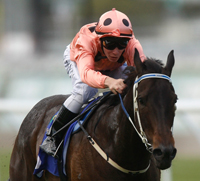Black Caviar |

The amazing Australian thoroughbred racehorse Black Caviar, foaled in Melbourne, undefeated in 25 races was retired on the 17th April 2013..
Black Caviar's success record of consecutive 25 wins (no losses) is a world record not equalled in over 100 years of horse racing.
Black Caviar was born on 18 August 2006 at Gilgai Farm in Nagambie, Victoria. Her last race was on Saturday 13th April 2013 in Sydney when she won easily by 3 lengths.
Black Caviar considered by most as the best sprinter in the world was named World Champion Sprinter by the World Thoroughbred Racehorse Rankings in 2010 and named Horse of the Year in 2011. She was also rated the top Thoroughbred racehorse in the world by Timeform, becoming the highest rated sprinter and mare in 2011.
She was trained by Melbourne-based Peter Moody, ridden by Luke Nolen in all her starts apart from her first two runs, in which Jarrad Noske rode her, and in the 2010 Patinack Farm Classic, where Ben Melham rode her while Nolen was suspended.
Highlights of her stunning career include:
- 25 consecutive WINS (no losses)
- Newmarket Handicap 2011 trophy (her 10th win)
- Black Caviar's racing colours (silks)
National Sports Museum
Black Caviar has already featured at the Champions gallery in National Sports Museum which features some of the most exquisite and significant horseracing treasures, including some of the oldest racing footage from around Australia.
Australian Racing Hall of Fame
Black Caviar continues to break new ground and on Thursday 21st February 2013 by being inducted into the Australian Racing Hall of Fame while still a competitor.
The six-year-old , who returned to racing in superb style when she smashed a 25-year-old track record at Flemington last Saturday, is the second horse in training to be elevated to such lofty status.
While there was plenty of discussion as to whether her predecessor, Sunline, was being prematurely included when she was inducted in the twilight of her racing career in 2002, there will be no debate about Black Caviar's place at racing's top table- an honour predicted by Fairfax Media this week. She is the biggest star to grace the Australian turf since Phar Lap and her record of 23 successive wins is unparalleled.
She was one of four champions to be inducted at a gala function in Melbourne, and one of them could not have been more different.
While Black Caviar is the pinnacle of equine speed, Crisp, that marvellous Australian steeplechaser of the late 1960s and early 1970s, epitomises other heroic equine virtues such as stamina , strength, jumping ability and toughness.
Crisp was a champion in Victoria, but is best remembered for his great display in the 1973 Grand National over the fearsome Aintree fences in England when he gave National legend Red Rum some 10.5 kilos and went down by less than a length after leading for most of the 7200 metres.
Other horses inducted into the Hall of Fame were Victoria Derby, Cox Plate and Melbourne Cup winner Delta, from the early 1950s, and that successful stallion Star Kingdom , a sprinter imported from Britain who sired five Golden Slipper winners as well as several sire sons.
It's unthinkable that Black Caviar will not be made a legend of the turf, alongside the likes of Phar Lap and Makybe Diva and the latest racing great to be so named on Thursday, Carbine, who carried the welter burden of 66 kilograms to win the 1890 Melbourne Cup. He takes his place as a legend alongside those two great gallopers and human legends Bart Cummings, Scobie Breasley and Tommy Smith.
The horses are the star of the show, but trainers, jockeys and administrators play a role too. Two riders were added to the hall of fame, Geoff Lane and Hughie Cairns. Lane was champion apprentice five times - taking the senior Premiership title on the last occasion. Cairns won Grand Nationals and hurdles as well as the Cox Plate and Melbourne Cup before being killed in a fall at Moonee Valley in 1929.
Trainer the late Bruce McLachlan, a dominant force in Queensland racing for four decades, as well as administrators Albert O'Cass , David Coles and Sir George Julius were also inducted.
O'Cass was a master farrier in NSW who was appointed a member of the Order of Australia in 1999, Coles was a breeder and bloodstock agent and chairman of the South Australian Jockey Club in the 1980s , while Julius, an English-born NZ engineer, developed the first modern day totalisator- installed in Auckland in March 1913.
❊ Web Links ❊
➼ Black Caviar
➼ www.nsm.org.au
➼ www.wikipedia.org/Black_Caviar
➼ Black Caviar challenge falls on deaf ears
Disclaimer: Check with the venue (web links) before making plans, travelling or buying tickets.
Accessibility: Contact the venue for accessibility information.
Update Page








